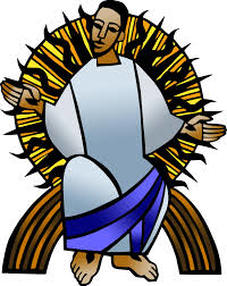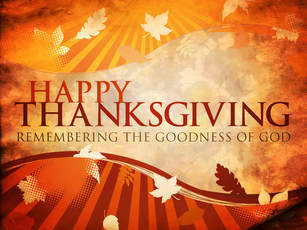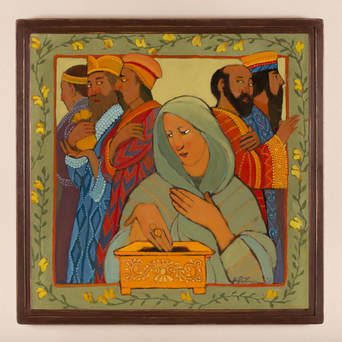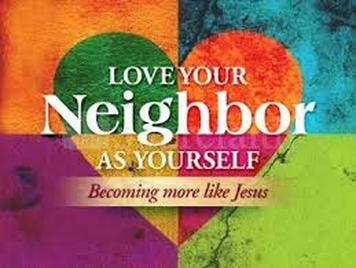
Despite all the wonderful experiences of this past week, delicious food, visits with loved ones and fellowshipping, enjoying the holiday lights and sales, Thanksgiving was marred. It was marred when Sandra Parks, age 13, was shot and killed in her own bedroom. Two years ago, Sandra wrote an award-winning essay, entitle Our Truth. She said: “Little children are victims of senseless gun violence ... I come to the same conclusion ... we are in a state of chaos." It was marred when news of dire climate change warnings dominated the news. It was marred when children searched for food in the rubbish of the streets of Yemen. It was marred when an eight-year-old girl was sold, a common practice, in Afghanistan so the rest of her family could eat in a region of unspeakable, deepening drought. Marine life die as it engulfs plastic instead of food. Wildfires still smolder. A volcano erupts in Guatemala. Vietnam floods. El Nino triggers severe weather in South America. Tijuana declares a humanitarian crisis as the migrant caravan nears, while thousands of U.S. troops wait on the other side of the border. We live in a state of wonder, marred by chaos.
Today, our last Sunday of the church year, is called “Christ the King” Sunday. Christ the King began in 1925, in the context of turmoil and unrest, wonder and chaos, a marred world in a time of splendor, much like we experience today. 1925 was a very serious time for our world. We had just emerged from the war to end all wars, and the signs were everywhere that it was hurtling towards another. An influenza pandemic killed 50 million people.There were unsettling economic troubles. A rising German politician named Adolf Hitler published his autobiography and political theories in a book entitled, Mien Kampf. The Italian leader Benito Mussolini dissolved the Italian parliament and became dictator. The far right and fascism spread in the face of the growing communist movement. The US was swayed by isolationism, the roaring 20s, the Scopes trial, and prohibition. 5% of the population owned 1/3 of the wealth; 42 % lived below the poverty line. The KKK was revived, and immigration was under attack, eugenics was a popular social movement in the 1920s. So the Pope declared, in a world struggling, conflicting powers, it is Christ who is King.
Christ the King, on this last Sunday of November, the last Sunday of our liturgical year, that first and foremost, no matter what the world says, our allegiance is to Christ. It is our duty to listen to and observe Jesus --- not just in the wonder but in the midst of the chaos of the world.
With the beauty of the season unfolding around us, our gospel lesson brings us face to face with Jesus, on the day of his death, standing before the Procurator Pilate. It is significant to note that at both the birth of Jesus and at the death of Jesus political leaders are named and present. When we celebrate Jesus’ birth later in December, we will recall Herod the Great and the massacre of the innocents, the census of Caesar Augustus all interwoven into the birth story and impact the early life of Jesus. And now, on the verge of Jesus’ death, Pontius Pilate, the fifth prefect of Judea, interrogates Jesus – with the religious leadership waiting in the wings, pulling the strings.
In all fourth gospels Pilate asks Jesus bluntly, “Are you the king of the Jews? It’s a question of life or death. Jesus never called himself king of the Jews. But the religious leadership are setting him up. Pilate must play this game. It is clear from the beating Jesus received during the night that no king would be treated in such a manner. But Pilate plays along not realizing who Jesus truly is: King of King. Lord of Lord. Holy Kingship that upends the human craving for power and control.
Pilate asks question after question to Jesus, who in turn stays silent: I am not a Jew am I? What have you done? So you are a king? Where are you from? Do you refuse to speak to me? What shall I do with Jesus? What evil has he done? Do you not know that I have the power to release you and the power to crucify you, and finally, Pilate’s startling inquiry, “What is truth?” Before Jesus can answer, Pilate walks away and faces the crowd and asks them one more question: “Do you want me to release for you the King of the Jews?”
Pressured by the crowd and leaders, Pilate delivers Jesus up to be crucified. Pilate knows Jesus is innocent. But he doesn’t care. Pilate took water and washed his hands before the crowd and says, “I am innocent of this man’s blood. It is your responsibility.” Pilate convinced himself that he had done nothing bad to Jesus when he was the only man in the city who could pass the death sentence. Pilate avoids taking responsibility. Pilate demonstrates leadership in its worst light: leadership unwilling to take a stance. To discover the truth. To lead through the chaos to light.
Contrast this to Jesus’ foot washing ceremony of the night before. Jesus lowered himself. He assumes responsibility for leading his disciples. Jesus attaches himself to those whom he serves -- he invests himself in the lives of others – Jesus cares, and he stands with those, even those who ultimately disappointment him.
So, what is truth, Pilate?
The main job of the Roman provincial governors was to keep things under control, to collect taxes and keep the peace. That was the truth, in their minds. Rome was in control. Caesar was god. In order to govern, the Romans usually let the local people keep their own religion and, as far as possible, manage their own affairs. Did Pilate interrogate Jesus in the interest of “Truth?” No. It was a cat and mouse game mean to enhance Pilate’s esteem in front of the crowds. Pilate acted like a modern CEO, protecting his stockholders’ interests, while hoping for that nice bonus at the end of the quarter.
Pilate is the opposite of the Kingly Christ. Pilate plundered the Temple treasury to construct an aqueduct into Jerusalem. He didn’t stop at beating protestors to death. Luke 13.1 mentions Pilate mixing the blood of Temple sacrifices with that of Galileans he had murdered. That was truth, in Pilate’s eyes. Raw power. Getting to do whatever you want to, because you can. Ignoring the dignity, pleas and plight of those with less or no power. Disposing of enemies, or even people who disagree with you. This is Pilate’s truth. This is truth, as the powerful and wealthy live it. Power is truth. With great irony this truth would depose Pilate as governor, exile him to northern Europe, where tradition says that he committed suicide in AD 37.
It is sad. How close, yet how far Pilate was from the Truth. Just a handshake away. Pilate looked Truth in the eyes. Pilate talked to Truth. But he didn’t understand. Truth was not an abstract construct. Jesus was Truth Incarnate. Jesus is the Truth, and truth is spelled out in his teachings and healings, and actions, actions like washing the feet of his disciples and talking with dignity and strength with Pilate, that his kingdom was not of this world. Not a corrupt kingdom that allows a gross disparity of wealth and ignores the plight of those in need. Jesus’ kingdom touches our hearts with a vision of the dignity of every person. That is Jesus’ reign.
All those questions Pilate asked. He was so close. But so far.
Pilate failed -- but yet he still insisted on placing a sign on Jesus cross: “Here is the King of the Jews.” Written in Aramaic, Latin and Greek. The religious leadership was displeased. Pilate shrugged. “What I have written, I have written.” We don’t know why Pilate did this. But if a corrupt, cynical, heartless Roman administrator can recognize something about Jesus -- even in jest -- well, maybe we can too.
So today, we find ourselves being fitted for the times we are born into. Living Truth, claim us, shape us, propel us to be part of the solution to the suffering around us! No more young girls shot dead in their bedroom. No more children shifting through garbage for a morsel of food. No more children being sold in exchange for food for a family. No more of God’s creatures ingesting plastic. As we begin our journey toward Christmas, let us align ourselves to the reign of Truth. In this marred world, we will serve. We will practice love. We will seek peace. We will demonstrate hope. We will know joy. We swear allegiance to Jesus, who was, who is, who is to come, the Alpha and Omega who is King of King, Lord of Lords, and leads us out of the chaos to true wonder, to the reign of righteousness created for us, this day and always. Amen.
http://www.nytimes.com/2012/10/10/business/organizers-say-wal-mart-labor-protests-spread.html
http://www.thenation.com/blog/171429/black-friday-begins-early-walmart-workers-already-striking-six-states#
http://www.forbes.com/sites/timworstall/2011/12/14/six-waltons-have-more-wealth-than-the-bottom-30-of-americans/



 RSS Feed
RSS Feed